Collaborative Cohort
Six New Faculty Members to Join Ohio Wesleyan University for 2021-2022 Academic Year
DELAWARE, Ohio – Ohio Wesleyan University is adding six assistant professors this fall who will work collaboratively to help advance OWU academics and support a diverse, equitable, and inclusive campus environment.
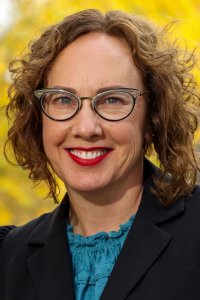
Provost Karlyn Crowley, Ph.D., said the cohort hire, Ohio Wesleyan’s first, will help to ensure the university continues to provide “the best liberal arts experience nationally” for current and future OWU students.
“This unique cohort was built around the three foci of flexibility, interdisciplinarity, and diversity, equity, and inclusion (DEI),” said Crowley, who oversees Ohio Wesleyan’s academic experience.
“Faculty will be flexible, or able to teach in a variety of ways that support the most innovative pedagogy, such as experiential and project-based learning. They’ll also be able to adapt courses in ways that continue to be relevant,” she said.
“Faculty will be interdisciplinary, or able to draw on multiple areas of study within their own courses, but also working across other areas and divisions and with other faculty in areas different from their own,” she continued. “Interdisciplinary knowledge, or analysis from multiple disciplines and perspectives, is critical to solving the wicked or intractable problems that our world faces.
“Finally,” Crowley concluded, “faculty will integrate DEI, or be able to incorporate diversity, equity, and inclusion into their teaching and mentoring, because our diverse and global world depends on inclusive excellence. This creative and talented incoming group of faculty will contribute with intelligence, passion, and joy to our community. We are eager to welcome them, be transformed by them, and in return support them in their new home at Ohio Wesleyan.”
The university’s newest faculty members and their departments and backgrounds are:
Africana, Gender, and Identity Studies
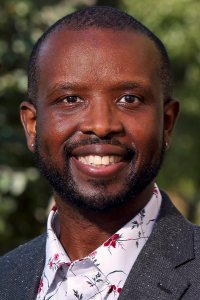
Antron Mahoney, Ph.D., is an interdisciplinary teacher-scholar whose work encompasses critical explorations of embodiment and freedom. He explores race, gender, and sexuality theories and politics in the context of social movements and leadership – specifically, examining African American and diasporic identity formation, subjectivity, and gender performance (inter)relating to Black feminist and queer praxis, U.S. higher education, and media studies. He is the first person to complete a doctorate in Pan-African Studies from the University of Louisville, where he also earned a graduate certificate in Women’s and Gender Studies. He has work published in books and journals such as the Journal of Leadership Studies, the International Journal of Postcolonial Studies, and the Maryland Law Journal of Race, Religion, Gender and Class, among others.
Economics and Business
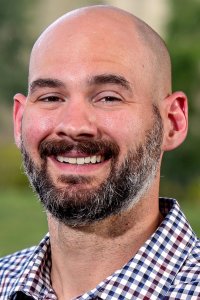
Will Georgic, Ph.D., studied Philosophy, Political Science, and Economics at Denison University before earning his doctorate in Agricultural, Environmental, and Development Economics at The Ohio State University. He has taught at both universities in addition to teaching at Kalamazoo College before joining Ohio Wesleyan. His liberal arts background and training in applied methods motivate both his teaching and research, with problem-solving and critical thinking emphasized in both activities. His research is primarily concerned with studying environmental problems likely to worsen with climate change and informing more efficient policy decisions. In the classroom, he is dedicated to helping students grow as pluralistic and empirical economists.
Education
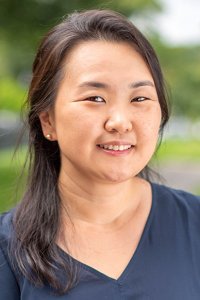
Bona Kang, Ph.D., strives to design inclusive and equitable learning environments that promote student agency, the development of metacognitive skills, and collaboration. Her K-6 classroom experience includes teaching-research partnerships with a college-affiliated lab school in western Massachusetts and multi-classroom case studies and efficacy studies in diverse public schools in the San Francisco Bay Area. Her research interests focus on elementary school children’s cognition and development in mathematics, and her teaching interests include the learning sciences, elementary school education, and mathematics education. She holds a Bachelor of Arts in Cognitive Science and a doctorate in Education (Development in Math and Science), both from the University of California, Berkeley, and has published in peer-reviewed journals and presented at national and international conferences.
Fine Arts
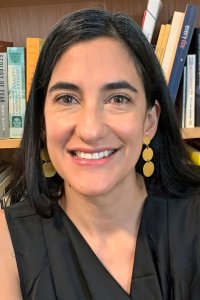
Alejandra Rojas Silva, Ph.D., is a Latin American art historian focused on representations of the natural world in relation to indigenous, colonial, and contemporary forms of identity. Her research, teaching, and curatorial work extend from the early modern period to the present. Her current book project, “Flora Incognita: Picturing Nature in Sixteenth-Century Spanish America,” analyzes some of the first images of American nature produced after the conquest. In addition to surveys of modern and contemporary art, Rojas Silva will offer courses that explore the intersection of art and science in Latin America and the use of Pre-Columbian forms within contemporary art. She holds a doctorate in History of Art and Architecture (Latin American Art) from Harvard University, a Master of Studies in History of Art and Visual Culture from the University of Oxford, United Kingdom, and a Bachelor of Arts in Classical Studies from Earlham College.
Performing Arts

Brian Granger, Ph.D., is a musical theatre book writer, playwright, theatre scholar, songwriter, and actor/director whose works are an ongoing exploration of how we treat one another across lines of race, gender, and class. His research interests include North American ethnic playwrights and Africana musicals, and he is a degree-holder from Kenyon College (Bachelor of Arts in Dance/Drama and English), The Ohio State University (Master of Fine Arts in English/Creative Writing), the University of California-Santa Barbara (Ph.D. in Theater Studies), and New York University/Tisch School of the Arts (MFA in Musical Theatre Writing), where he studied under some of the nation’s greatest living (and Tony Award-winning) musical creators.
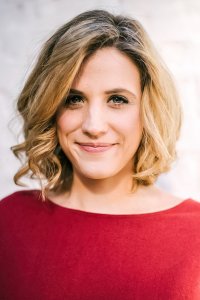
Cortney Knipp, MFA, is the artistic director of UVA Acts, an applied theatre program promoting equitable classrooms and faculty workplaces at the University of Virginia. Prior to starting UVA Acts in 2018, she was the director of community engagement at Milwaukee Repertory Theater. As an applied and community-based theatre practitioner, Knipp has facilitated artistic processes for professional theatres, nonprofit organizations, K-12 schools, government agencies, and universities. Her artistic practice centers on facilitating agentive, asset-based processes with and for communities, and her research focuses on grassroots theatre practices in institutional settings. She holds a Bachelor of Arts in Theatre Arts from Furman University and a Master of Fine Arts in Drama and Theatre for Youth and Communities from The University of Texas at Austin.
Ohio Wesleyan’s newest professors join a university where 100 percent of full-time, tenure-track faculty hold a doctoral (Ph.D.) degree or the equivalent terminal degree in their field. In addition, all OWU professors are classroom teachers, as the university does not have graduate teaching assistants. Ohio Wesleyan professors also serve as academic advisers and mentors, helping students to succeed and thrive as they work to earn their bachelor’s degree and plan their life’s path.
Founded in 1842, Ohio Wesleyan University is one of the nation’s premier liberal arts universities. Located in Delaware, Ohio, the private university offers more undergraduate majors than many universities its size and competes in 24 NCAA Division III varsity sports. Through its signature program, The OWU Connection, Ohio Wesleyan teaches students to integrate knowledge across disciplines, build a diverse and global perspective, and apply knowledge in real-world settings. Ohio Wesleyan is featured in the book “Colleges That Change Lives” and included on the U.S. News & World Report and Princeton Review “best colleges” lists. Learn more at owu.edu.
